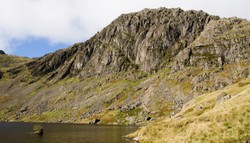The first step to creating a control society is to create an emergency, or better still grasp the opportunities provided by a real one. Let us take the example of the twin towers. This was a genuine emergency that was posed by a major international threat to the West, but certain leaders took their chance to try to introduce measures that looked like the beginnings of a control society. One such example was Britain, where Tony Blair, who seemed quite comfortable with authoritarians like Gaddafhi, introduced a series of practices which posed a threat to civil liberties. Many Britons saw these as the thin end of the wedge by which a police state was being slowly introduced to Britain. Fortunately Blair is now gone and Britain's traditional liberties are now safe.
The first step is to tell the people that civil liberties/ human rights need to be suspended or curtailed. Blair was regularly on television informing us that the rules had changed, but he never said who was making the rules. The victim group was Muslims, not all, only those deemed a threat. Well it was true that some were a threat, but the measures were illiberal. Potential terrorists could be arrested [good] but they did not have the right to know the charges against them or the evidence on which the charges were based. Furthermore, the arrested could be kept under control orders in house arrest without limits of time. Arrest without warrant and imprisonment without trial, without the ability to see the evidence against you or knowing when you will be released is a standard trick of tyrants across the world. Also a technique is the threat to due process. Blair's government did not want jury trial for the terrorists, and they tried to get round this by the use of control orders, which kept people under house arrest for many years, often without knowing the charges against them. Many Britons were appalled at what was happening, because while they knew the need to suppress terrorism, they could see that the door was being slowly opened to a police state. When it happens to one group, ultimately the repression slowly spreads to another, and ultimately we are all in danger.
Other illiberal measures contrary to British liberal democratic traditions were the proposed introduction of identity cards, which all British citizens would be obliged to carry. Identity cards become permission to walk on the streets and are prone to abuse by police forces. If a card is necessary for your exercise of civil rights such as voting or access to state services, police officers can cause serious problems to you by destroying your card. This was done under the notorious South African pass laws, when black people would have their cards destroyed and then be accused of entering a white area without a pass. In the hands of ill-intentioned politicians such identity cards are a real threat to democracy. Fortunately the pressure for identity cards was ended when the coalition government came to power. There are weaknesses in any coalition, and the Tory element of the government is not sympathetic to the poor or to workers, but the British people sat more securely with their liberties under the coalition government than under its predecessor.Sadly the coalition is no more, there having been an election which nearly eliminated its progressive element, the Liberal Democrats.









 Darkness over the Earth the skies darkened when Jesus was crucified17 days ago
Darkness over the Earth the skies darkened when Jesus was crucified17 days ago
 TheThousand Year Gardenon 11/26/2025
TheThousand Year Gardenon 11/26/2025
 Women of the Gospelson 10/11/2025
Women of the Gospelson 10/11/2025
 Religious Gardenson 08/25/2025
Religious Gardenson 08/25/2025



Comments
I suppose that his ideas are influential in this country.
Thank you!
Urban forester Cecil Konijnendijk approves of a 3-30-300 rule for urban-canopy coverage. He counsels each living space within sight of at least 3 trees, within a neighborhood with at least 30-percent canopy cover and within at least 300 feet of a green space such as a park.
Might that 3-30-300 rule being affecting urban-forestry design and plantings in the British Isles?
I think that our present government tries to focus on private initiative and expenditure.
Thank you!
The UBC researchers also find that tree-canopy projections through 2050 may focus more and more on private initiative -- because of densification requiring more business, public, road, sidewalk and structure space -- to achieve canopy goals.
Those goals may be summarized as 3-30-300 for the optimally nearest spacing that maximizes the ecosystem services of urban trees.
Might there be that same tendency eastern pond-wards?
I think that a densifying trend can be detected.
University of British Columbia researchers are looking at social-justice and tree-canopy implications of Vancouver municipally densifying.
That aforementioned term assumes its noun form as densification, for arranging living and working spaces ever more concentratedly in ever larger cities.
Its proponents assure us that densifying avails its densified areas of lower energy bills and costs and outputs and of lower greenhouse and pollutant and stress levels than the North American tradition of small-house series in homeowner neighborhoods within big cities and of small-house series in homeowner neighborhoods within small towns and villages.
Is there such a trend in the British Isles?
Gerry Adams of Sinn Fein says that he dislikes the British establishment, but does not dislike the British. When we think of America, it is fair to say that when we meet Americans they seem an amicable, pleasant bunch of people who don't seek trouble [all countries have their bad guys, we British do] but the American political and capitalist establishment is sometimes criticized.
frankbeswick, Thank you for the informative think-piece. I remember hearing of so many government leaders -- most recently Saddam Hussein -- saying that they differentiate between the government -- which they dislike -- and the people -- whom they like as generally good-intentioned and hard-working -- of the U.S.A. Have you heard that observation, and is the same ever said by British Islers about other countries or by other countries about the British Isles?
We speak of the paradox of freedom, which means that without limits on behaviour there can be no freedom other than for the strong and well armed. I live by a strict moral law. and I want the freedom to promulgate and live by it, but I am committed to allowing others to live by their consciences as well according to the principle that we should not interfere in another adult's freedom except to prevent harm to others. I am aware that many authoritarian people like to invent harm so as to interfere in other's lives.
I always knew that Blair was being deceptive about the Iraq war. He knew that Saddam hated Bin Laden and had had nothing to do with the twin towers, but Blair wanted Saddam out of the way, and so took part in a war on a deception.The whole war was based on a false cause.
Yes, secularists are using the equality laws to persecute Christians. It is only a weak persecution, but real nonetheless.
I enjoyed reading your thoughts. Freedom of thought is important in sorting out the matters of life, but when it comes to living them out, if there are not boundaries of some kind, a moral compass, things can so quickly get out of hand. I don't live in Europe, but after the events like the World Trade Center which was geographically VERY close to us, response came accordingly, and made sense for that time...I thought Tony Blair made sense at that time as well, but am not well informed as to overall British politics. Things change and what makes sense at one time may not at another.
Freedom, however, is affected, as you show in your samples, by who is "running the show" at the time, and who is being allowed to be heard. For example, I am a Christian, I live by the moral compass of God in the Bible, it is a simple black and white way to live, but not at all popular now...so who are the ones being suppressed now? Who are the ones losing jobs because they won't do such and such and so and so in keeping with the new laws set forth? I could go on, but will stop and hope I've made some sense :-)